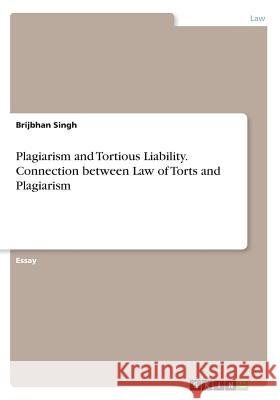Plagiarism and Tortious Liability. Connection between Law of Torts and Plagiarism » książka
Plagiarism and Tortious Liability. Connection between Law of Torts and Plagiarism
ISBN-13: 9783668353497 / Angielski / Miękka / 2016 / 20 str.
Essay from the year 2016 in the subject Law - Media, Multimedia Law, Copyright, National Law University and Judicial Academy, Assam, language: English, abstract: Plagiarism is the idea of taking someone's writing, conversation, song, or in fact idea and showing it as your own creation. This includes information from the internet, written work, songs, telecasted shows, email, messages, questionnaire interviews or any other type of literary work. Whenever you paraphrase, summarize, precise or take words or sentences from another person's literary work, it is necessary to indicate the source of the information from which you have taken it within your paper using an internal citation. Failing to acknowledge someone else's literature or ideas with an internal citation or bibliography is plagiarism. Plagiarism is not copyright infringement but it actually predates the idea of copyright laws, thus it is basically an ancient tort. If anyone commits plagiarism then there are remedies to the plaintiff if he approaches the court of law. In this research paper, the researcher will focus on how plagiarism is connected to law of torts and also on what self-plagiarism is. Furthermore, there is a case study of a famous case of plagiarism: Bajpayee v. Rothermich, 372 N.E.2d 817 (Ohio Ct. App. 1977). The researcher will also try to connect tort of defamation and tort of strict liability to plagiarism and will try to distinguish whether plagiarism is an evil or a trivial matter.











